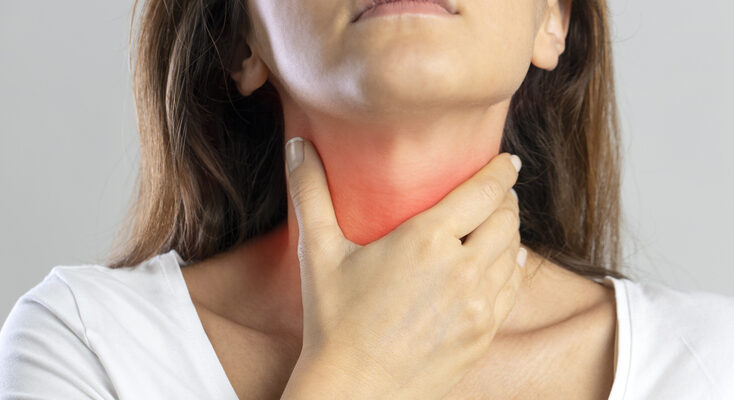
COVID-19, the illness caused by the SARS-CoV-2 virus, can be detected using two testing modalities: diagnostic and antibody tests. Of these, diagnostic tests are separated into polymerase chain reaction (or PCR) tests and rapid antigen tests. The difference in the test samples, result times, and diagnostic procedures indicated by these tests changes their effectiveness and availability depending on the circumstances.
By reviewing types of COVID-19 testing in-depth, including throat tests, we hope to give you a general idea of their respective uses, contraindications, and limitations. Frequent testing is a valuable way to protect at-risk individuals from exposure to the virus that causes COVID-19, which combined with vaccination, frequent hand-washing, and social distancing can limit the spread of the illness.
What is a Covid Diagnostic Test?
A COVID diagnostic test analyzes the patient’s sample to determine if they are currently infected. Though tests were initially only available to those who exhibited symptoms of the virus, they are now authorized for use in the presence and absence of these symptoms.
Diagnostic tests are performed on swab samples whose source can vary from saliva to nasopharyngeal or oropharyngeal in origin. The tests are conducted in facilities, including testing sites, labs, doctor’s offices, and other clinics equipped with the necessary equipment. Depending on the test type, at-home diagnostic tests can also be performed.
The available COVID diagnostic tests can be broadly separated into PCR and rapid antigen tests, each with its own requirements and limitations in testing for COVID-19.
PCR Tests
Polymerase chain reaction tests test the patient’s DNA by copying specific segments and using primers to match them to genetic material found in the virus (in this case, SARS-CoV-2). The material can be copied repeatedly to confirm the results.
A positive PCR test result indicates the presence of SARS-CoV-2, resulting in a diagnosis of COVID-19. A negative PCR test result could indicate the absence of the virus. However, samples collected too early after infection or collected using improper methods could simply contain too little of the virus to be detected in that sample.
Despite this, PCR tests are considered the most accurate diagnostic tool for quickly confirming the presence of the SARS-CoV-2 virus. Testing clinics are readily available for free that help you collect the samples and send them for laboratory testing, which generally returns results in 1-2 days.
Rapid Antigen Tests or The Throat Covid Test
Rapid antigen tests were approved early in the pandemic by the FDA under EUA or Emergency Use Authorization guidelines. These tests utilize simple methods known as lateral flow assays to detect viral proteins in the patient’s sample.
These tests do not require hospital laboratory equipment to conduct and can be performed on-site, with near-immediate results. They can also be performed at home with approved rapid antigen test kits.
What is a Covid Antibody Test?
A COVID antibody test should never be confused with the diagnostic tests. Antibody tests cannot diagnose a current COVID-19 infection. Instead, these tests examine a blood sample to find the antibodies produced by your body in response to the SARS-CoV-2 virus. In other words, COVID antibody tests can determine whether a person had an infection in the past.
Keep in mind that antibody tests cannot diagnose symptoms or measure immunity.
Which Test Should I Use?
The three available tests for COVID-19 have different uses depending on a patient’s timetable for exposure, symptoms, and intentions. Antibody tests should only be used to detect past infections, not to diagnose symptoms.
Of the remaining diagnostic tests, PCR tests are considered 30-40% more accurate than rapid antigen tests. They rarely produce a false negative result (negatively diagnosing an infected person) but statistically produce more false positives (falsely diagnosing COVID-19 in a healthy person) than rapid antigen tests. This could lead to unnecessary quarantine procedures.
Rapid antigen tests return results faster at the expense of accuracy, with negative results often being considered only 60% accurate. However, they are most accurate when used 7 days after exposure to the virus or in the presence of symptoms. A positive rapid antigen test, especially in the presence of COVID symptoms, is considered a valid reason to quarantine.
The Takeaway
For people in many professions, such as those in the healthcare and travel industries, frequent COVID testing has become routine. To protect yourself and those around you, it’s important to know when to use each of the three types of COVID tests.
Speedy Sticks is a mobile concierge phlebotomy service that provides at-home blood draws and on-site diagnostic/health screenings for businesses and individuals. One of these tests is COVID-19 testing which can be performed by one of our specialists. Book an appointment today to keep you and your family safe.
*This content is for informational purposes only and is not meant to replace consulting with a healthcare professional. Please consult with your primary care physician or healthcare provider before engaging in any services offered by Speedy Sticks.




